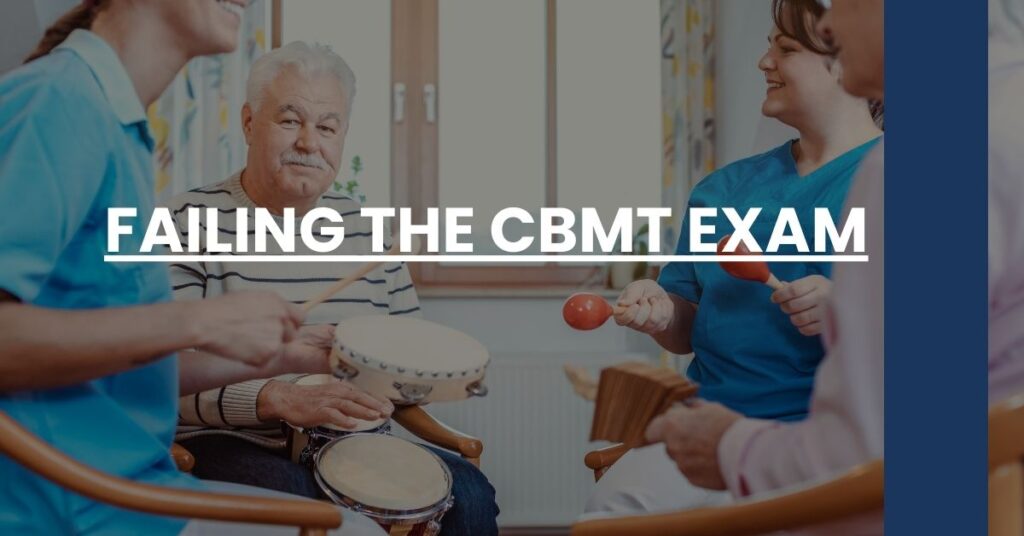If you’ve failed the CBMT exam, it’s crucial to understand that it’s only a temporary setback. Your next steps should be strategically focused on identifying your weak areas and honing your test-taking skills for a successful retake.
Here is a quick guide to bounce back:
- Review your score report to target areas for improvement.
- Develop a tailored study plan utilizing resources like study groups or professional mentoring.
- Retake the exam with enhanced strategies and a resilient mindset.
Remember, perseverance is key, and with a dedicated approach, you can turn this challenge into a triumph.
Understanding the CBMT Exam
The road to becoming a board-certified music therapist is both challenging and rewarding, culminating in the Certification Board for Music Therapists (CBMT) exam. This rigorous test is the gatekeeper to the esteemed MT-BC credential, marking a significant milestone in your professional development. To navigate this journey successfully, it’s imperative to grasp the CBMT exam’s structure and purpose.
The CBMT is a specialized exam designed to measure your knowledge and skills in music therapy across various domains. These include clinical practice, assessment, documentation, and professional development, among others. With 150 multiple-choice questions to answer over a three-hour period, the exam assesses your readiness to deliver high-quality care to clients.
The Exam’s Components
- Clinical Practice: This covers direct and indirect client services, program development, and therapeutic application of music.
- Assessment and Documentation: You’ll find questions on diverse assessment tools and accurate client documentation.
- Ethics and Professionalism: Expect to demonstrate your understanding of professional ethics and responsibilities.
Importance of Certification
Being certified is not just about having letters after your name; it’s a testament to your expertise and commitment to uphold the standards of the field. It reassures employers and clients alike that you are qualified to practice music therapy at the highest level.
In light of the stakes, should you find yourself failing the CBMT exam, it can indeed be disheartening. Yet, this is not an impasse, but a redirection to regroup and strategize for success on your next attempt.
Common Reasons for Failing the CBMT Exam
As you reflect on the outcome, it’s crucial to identify the hurdles that may have impacted your performance. Recognizing these areas is the first step in turning the tide for your retake.
- Preparation Gaps: Perhaps your study plan overlooked key areas, or lacked the depth needed for the questions encountered.
- Exam Anxiety: Nerves can wreak havoc on exam day, impairing your ability to recall information and make sound decisions.
- Time Management Issues: Running out of time or spending too long on certain questions can mean you don’t give each area the attention it requires.
It’s essential to analyze these factors honestly but without self-reprimand. Remember, this exam is a learned skill as much as a test of knowledge.
Immediate Steps After Failing the CBMT Exam
Your score report is a valuable tool, offering a detailed breakdown of your performance. It lays out where you excelled and, more importantly, where your responses fell short. Take this time to review your scores, so you can rebuild your study approach with a clear focus on the weak spots.
Concurrently, familiarize yourself with the CBMT’s retake policies. Understanding the logistics of retaking the exam, such as the 30-day waiting period, will help you plan your next steps and timeline effectively.
Navigating the Retake Policy
- You must wait a stipulated 30 days before reapplying to retake the exam.
- Should you perceive any unfairness in your examination experience, there’s a window of 30 days to appeal.
Armed with this information and a positive mindset, you’re ready to chart a new course toward overcoming the hurdle of failing the CBMT exam.
Developing an Effective Study Plan
Now let’s devise a study plan that’s as intricate and harmonious as the most well-arranged composition.
Pinpoint Areas of Improvement
Start with your score report’s feedback; it’s like having a conductor highlight areas in your performance that need more practice. Concentrate your studies on those sections where your understanding is less robust.
Gathering Resources and Tools
Use a variety of study materials to ensure you’re looking at the material from every angle. Educational literature, past exams, and the Self-Assessment Examination (SAE) provided by CBMT can be invaluable for showing you what to expect and identifying strong and weak content areas.
Creating a Study Timeline
- Regular Study Intervals: Spread your study sessions over time instead of cramming. This will improve retention and minimize burnout.
- Mock Examinations: Schedule practice exams under timed conditions. These simulations will help you gain familiarity with the exam format and work on pacing.
Engaging With the Material
- Active Learning: Use flashcards, teach back the material to a peer, or explain concepts in your own words.
- Group Studies: Study groups can offer new perspectives and moral support.
Your new study plan will be a blueprint to a successful retake. A meticulously tailored approach will bolster your confidence and your scores when you next face the CBMT exam.
Exam Retake Strategies
Passing the CBMT exam on your second try is within reach. Let’s enhance your approach with strategic exam retake strategies focused on efficiency and effectiveness.
Honing Time Management
Time can be either your ally or adversary during exams. To master it:
- Monitor Your Pace: Aim to spend approximately one minute per question.
- Prioritize Questions: Address those you’re sure about first, then circle back to tougher ones, ensuring no question goes unanswered.
Analyzing Questions Thoroughly
Active reading is pivotal. For each question:
- Look for keywords or terms that hint at the correct answer.
- Eliminate obviously incorrect choices to improve your odds if guessing is needed.
Stress Reduction Techniques
Minimize test anxiety by:
- Practicing deep breathing or mindfulness meditation before and during the exam.
- Adopting a positive affirmation routine to bolster your confidence.
Remember, a calm mind is clearer and more adept at problem-solving. Incorporate these strategies into your daily life leading up to the exam.
Support and Resources for CBMT Exam Preparation
You are not alone in this endeavor. Many have navigated the choppy waters of failing the CBMT exam, and a wealth of support and resources await to guide you through your next attempt.
Leverage Study Groups
Join study groups or create one. Peer support can provide new insights and foster a sense of camaraderie that may help mitigate exam stress.
Seek Professional Mentoring
Connecting with a seasoned music therapist can provide personalized advice and moral support. Probe into their experiences and strategies that led them to success.
Utilize Relevant Literature
Resources like the CBMT Candidate Handbook and AMTA’s publications offer valuable insights into the intricacies of music therapy and the CBMT exam structure.
Take advantage of these resources and carve a path that suits your learning style. Remember, every tool you utilize brings you a step closer to success.
Mindset and Coping with Failure
It’s natural to feel discouraged after failing the CBMT exam, but the key to resilience is keeping your failures in perspective. This is not the end of your journey, but rather an important learning curve on your professional path.
Treat Failure as a Learning Experience
Every challenge carries a lesson. Reflect on what this experience has taught you about your study habits, knowledge gaps, and resilience.
Stay Connected with Your Passion
Reconnect with why you chose music therapy. Let your passion for the field fuel your determination to conquer the exam.
Practice Self-Care
Invest time in activities that rejuvenate your spirit and keep stress at bay. Whether through exercise, meditation, or music, caring for your mental health is paramount.
With a constructively critical mindset, the experience of failing the CBMT exam can be transformed into a catalyst for growth, not a setback.
Conclusion: Bouncing Back Stronger After a Setback
Your journey doesn’t end with failing the CBMT exam. Think of this not as a defeat but as an opportunity to come back even stronger. Persistence and determination are powerful allies; harness them.
Armed with a reinvigorated study regimen, refined test-taking strategies, a trove of support resources, and a resilient mindset, you are more prepared than ever to tackle the CBMT exam once more. Trust in your abilities, lean on your resources, and let your commitment to your craft illuminate your way forward.
Remember, every accomplished music therapist has encountered challenges. What defines your professional narrative isn’t the setbacks you face but how you rise above them. Get ready, because your success story is just waiting to be written.
Failing the CBMT exam? Discover effective steps for recovery, optimizing study strategies, and resources to help you succeed.

